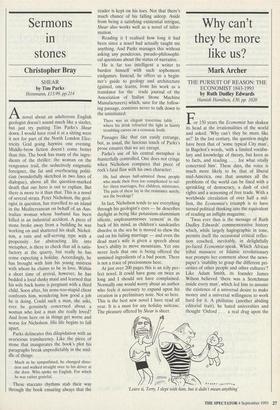Why can't they be more like us?
Mark Archer
THE PURSUIT OF REASON: THE ECONOMIST 1843-1993 by Ruth Dudley Edwards Hamish Hamilton, £30, pp. 1020 For 150 years the Economist has shaken its head at the irrationalities of the world and asked: 'Why can't they be more like us?' In the last century, the question might have been that of 'some typical City man', in Bagehot's words, 'with a limited vocabu- lary and knowledge of theory, but keen as to facts, and reading . . . for what vitally concerned him'. These days, the voice is much more likely to be that of liberal mid-America, one that assumes all the problems of the world can be fixed with a sprinkling of democracy, a dash of civil rights and a seasoning of free trade. With a worldwide circulation of over half a mil- lion, the Economist's triumph is to have turned political thinking into the equivalent of reading an inflight magazine.
'Twas ever thus is the message of Ruth Dudley. Edwards' commemorative history which, while largely hagiographic in tone, permits itself the occasional critical reflec- tion couched, inevitably, in delightfully po-faced Economist-speak. Which African tribal massacre or Islamic revolutionary war prompts her comment about the news- paper's 'inability to grasp the different pri- orities of other people and other cultures'? Like Adam Smith, its founder James Wilson believed 'there was a Scotchman inside every man', which led him to assume the existence of a universal desire to make money and a universal willingness to work hard for it. A philistine (another abiding editorial trait), he hated universities and thought 'Oxford . . . a real drag upon the
age, and a hindrance to real education'. A Scottish quaker, Wilson made his fortune in the family hat business, but it was his pamphleteering attacks upon the Corn Laws, with their pioneering use of statistics in support of free trade, which brought him to the attention of the Anti-Corn Law League and one of the League's figure- heads, Lord Radnor. Radnor's financial support was critical to the paper's survival following its launch in 1843. Wilson gradu- ated into politics, becoming Financial Sec- retary to the Treasury under Gladstone's Chancellorship in 1852. Appointed Chan- cellor of the Exchequer to India, the coun- try's labyrinthine public finances finally got the better of him. He died from dysentary aggravated by overwork in Calcutta in 1860, aged 55, his final words apparently being 'Take care of my Income Tax.'
Distinguished writers and editors suc- ceeded — Bagehot, at heart a deeply con- servative banker, with a Whiggish distrust of institutions and traditions that stood in the way of honest trade (he married the founder's daughter, Eliza); the philosopher Herbert Spencer; Richard Holt Hutton, who later co-edited The Spectator with Meredith Townsend for over 30 years; and Asquith. Its editorial concerns have remained unusually constant: support for free trade and a distrust of state interfer- ence in the invisible hand of commerce. These are hardly the rallying cries for a good read, 'cautious and slightly on the dull side of solid' was a 19th-century view, but then the paper has always reflected the loy- alties of one of its early titles: The Economist, Weekly Commercial Times, and Bankers' Gazette. Its instincts have occa- sionally proved correct. The paper opposed home rule in Ireland because it doubted whether the Irish economy was sustainable without tariffs or subsidies, an unusual point of view at the time but borne out by today's huge amount of EEC grant aid directed to Ireland. It has helped unearth bank scandals, from Overend, Gurney & Company Ltd in 1866 to BCCI in 1988, and it has questioned the wisdom of Third World loans, or what Bagehot, criticising a British credit to Egypt in the 1880s, termed `Loans to semi-civilised countries'.
But if the Economist's history seems to get duller as it moves into the 20th century, it is because the minds which made it inter- esting in the previous century are replaced by editorial functionaries, who seem to have an even more unadorned point to make. Its founder's vision was a world in which an honest man could make a living. But it really needed as brilliant a word- smith as Bagehot to make a virtue of dullness.



















































 Previous page
Previous page